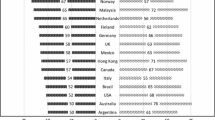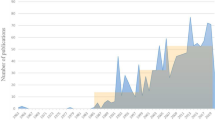Abstract
How is academic knowledge organized? Does thisvary from country to country, and, if so, how?This paper explores these questions through anexamination of some of the data included in theCommonwealth Universities Yearbook 2001.In particular, an analysis is presented of thedifferent names given to basic academic units(departments, schools and/or faculties) inAustralia, Nigeria and the United Kingdom.Evidence is provided regarding forms ofinstitutional organization, and of the varyingstrength of different disciplines or fields ofstudy.
Similar content being viewed by others
References
Askling, B., Henkel, M. and Kehm, B. (2001). ‘Concepts of knowledge and their organisation in universities’, European Journal of Education36(3), 341–350.
Association of Commonwealth Universities (2001). Commonwealth Universities Yearbook 2001: A Directory to the Universities of the Commonwealth and the Handbook of Their Association. London: Association of Commonwealth Universities, Two Volumes.
Barnett, R. (2000). Realizing the University in an Age of Supercomplexity. Buckingham: Open University Press.
Becher, T. (1989). Academic Tribes and Territories: Intellectual Enquiry and the Cultures of Disciplines. Milton Keynes: Open University Press.
Becher, T. (1999). Professional Practices: Commitment and Capability in a Changing Environment. New Brunswick, NJ: Transaction.
Becher, T. and Kogan, M. (1992). Process and Structure in Higher Education, second edition. London: Routledge.
Becher, T. and Trowler, P. (2001). Academic Tribes and Territories: Intellectual Enquiry and the Culture of Disciplines, second edition. Buckingham: Open University Press.
Blaxter, L., Hughes, C. and Tight, M. (1998a). ‘Telling it how it is: Accounts of academic life’, Higher Education Quarterly52(3), 300–315.
Blaxter, L., Hughes, C. and Tight, M. (1998b). ‘Writing on academic careers’, Studies in Higher Education23(3), 281–295.
Blaxter, L., Hughes, C. and Tight, M. (2001). How to Research, second edition. Buckingham: Open University Press.
Braxton, J. and Hargens, L. (1996). ‘Variation among academic disciplines: Analytical frame-works and research’, in Smart, J. (ed.), Higher Education: Handbook of Theory and Research, Volume XI. New York: Agathon, pp. 1–46.
Clark, B. (1983). The Higher Education System: Academic Organization in Cross-national Perspective. Berkeley, CA: University of California Press.
Delanty, G. (2001). Challenging Knowledge: The University in the Knowledge Society. Buckingham: Open University Press.
Fuller, S (2000). The Governance of Science. Buckingham: Open University Press.
Gibbons, M., Limoges, C., Nowotny, H., Schwartzman, S., Scott, P. and Trow, M. (1994). The New Production of Knowledge: The Dynamics of Science and Research in Contemporary Societies. London: Sage.
Higher Education Funding Council for England (2000). Diversity in Higher Education: HEFCE Policy Statement.Bristol: HEFCE.
Huisman, J. (1995). Differentiation, Diversity and Dependency in Higher Education: A Theoretical and Empirical Analysis. Utrecht: Lemma.
Neumann, R. (2001). ‘Disciplinary differences and university teaching’, Studies in Higher Education26(2), 135–146.
Nowotny, H., Scott, P. and Gibbons, M. (2001). Re-thinking Science: Knowledge and the Public in an Age of Uncertainty. Cambridge: Polity Press.
Peacocke, A. (ed.) (1985). Reductionism in Academic Disciplines. Guildford: NFER-Nelson.
Pring, R. (1993). ‘Liberal education and vocational preparation’, in Barrow, R. and White, P. (eds.), Beyond Liberal Education: Essays in Honour of Paul Hirst. London: Routledge, pp. 49–78.
de Ridder-Symoens, H. (ed.) (1992). A History of the University in Europe.Volume I: Universities in the Middle Ages. Cambridge: Cambridge University Press.
de Ridder-Symoens, H. (ed.) (1996). A History of the University in Europe.Volume II: Universities in Early Modern Europe (1500–1800). Cambridge: Cambridge University Press.
Scott, P. (1995). The Meanings of Mass Higher Education. Buckingham: Open University Press.
Tight, M. (1996). ‘University typologies re-examined’, Higher Education Review29(1), 57–77.
Tight, M. (ed.) (2000). Academic Work and Life: What It Is to Be an Academic, and How This Is Changing. Oxford: Elsevier Science, pp. 406.
Twining, W. (1990). ‘Laws’, in Thompson, F. (ed.), The University of London and the World of Learning 1836–1986. London: Hambledon Press, pp. 81-114.
Verger, J. (1992). ‘Patterns’, in de Ridder-Symoens, H. (ed.), A History of the University in Europe.Volume I: Universities in the Middle Ages. Cambridge: Cambridge University Press, pp. 35–74.
Author information
Authors and Affiliations
Rights and permissions
About this article
Cite this article
Malcolm, T. The organisation of academic knowledge: A comparative perspective. Higher Education 46, 389–410 (2003). https://doi.org/10.1023/A:1027303214473
Issue Date:
DOI: https://doi.org/10.1023/A:1027303214473




